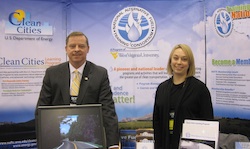The National Alternative Fuels Training Consortium (NAFTC) has been training renewable fuel industry members, technicians and consumers for more than a decade and chances are you’ve encountered their work but may not have realized it. The consortium was founded in 1992 initially to train and educate the natural gas industry. This was when the first natural gas vehicles were coming on the scene and there was a need to train technicians to work on these vehicles. Thus, West Virginia University formed NAFTC.
Today, the organization has expanded to other gaseous fuels, renewable fuels and advanced technology vehicles. Executive Director Al Ebron said that they have three key areas that they focus on: project management where they manage large projects in the renewable fuels and advanced technology vehicle areas, curricula development and subsequently turning that curriculum into training programs, and outreach and education.
 With the support of key members comprised of national training centers (that are made up of community colleges, universities and private training institutions), and their associate members that include high schools, NAFTC goes around the country and conducts specialized training workshops. Ebron explained that when they do technical training, they focus on one fuel. However, there are some courses, for example when they do first responder safety training, where they focus on multiple fuels.
With the support of key members comprised of national training centers (that are made up of community colleges, universities and private training institutions), and their associate members that include high schools, NAFTC goes around the country and conducts specialized training workshops. Ebron explained that when they do technical training, they focus on one fuel. However, there are some courses, for example when they do first responder safety training, where they focus on multiple fuels.
Today, NAFTC, a nonprofit organization, is doing a lot of work with the U.S. Department of Energy (DOE). They have several major initiatives including the Clean Cities Learning Program where they are developing first responder safety training programs and they are developing petroleum reduction technologies, manuals and training programs. In addition, they are working on the Advanced Electric Drive Education Program. This is a very large program focusing on electric drive vehicle programs and the first elements of this program will be launched in the coming months.
The majority of their training sessions are in the summer when more people have the flexibility to attend and for those interested, you can view a schedule on NAFTC’s website. You can also obtain more information about how to become involved in supporting various programs in which the consortium is currently engaged.
To learn more about all of the work of NAFTC, listen to my interview with Al here: Interview with Al Ebron

